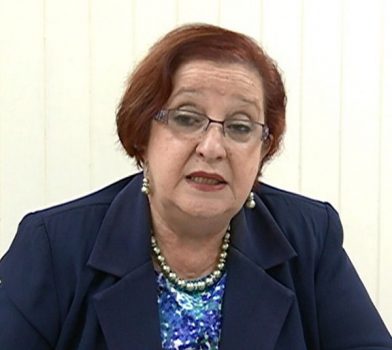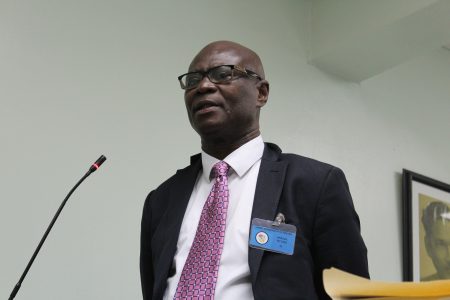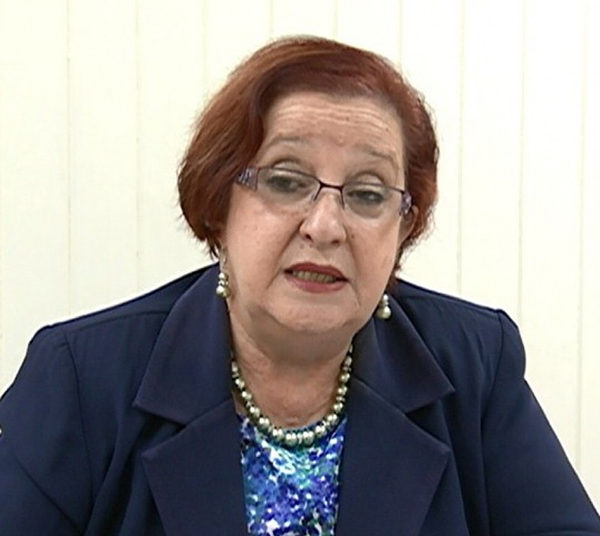PPP/C Member of Parliament and parliamentary whip Gail Teixeira has criticised the Head of the Special Organised Crime Unit (SOCU) Sydney James for appearing before the Commission of Inquiry (CoI) on lands, which she also says appears to have strayed from its gazetted terms of reference.
When James appeared before the CoI on Wednesday, he testified about a number of matters, including SOCU’s probe of the controversial ‘Pradoville 2’ housing scheme at Goedverwagting’ on the East Coast of Demerara. The CoI heard on Wednesday that the area in which the housing scheme is situated might have been ancestral lands owned by the descendants of freed African slaves.
In a statement on Thursday on the CoI’s proceedings so far, Teixeira noted that the Terms of Reference (ToR) gazetted on March 11 listed the objective of the CoI as “To examine and make recommendations to resolve all issues and uncertainties surrounding the claims of Amerindian Land titling, the individual, joint or communal ownership of lands acquired by freed Africans, and any other matters relative to land titling in Guyana.”

Further, she said that the recital to the ToR noted that the “…lands that were purchased by the freed Africans around and after 1839, and formed the first villages in Guyana, have not been accessible to their descendants for various reasons. Lands, which were acquired by freed Africans and were the subject of joint or communal ownership or of individual ownership, are now subject to much uncertainty.”
“Under what rationale is the Head of SOCU appearing before this Commis-sion? This is the body that is mandated to work with the Financial Intelligence Unit (FIU) to address money-laundering and the financing of terrorism? What has this got to do with Amerindian and lands purchased by freed Africans or any other matters relating to land titling?” Teixeira queried
She said that one expected to see many of the African non-governmental organisations lining up to appear before the CoI with regard to the issues concerning land purchased over a 170+years ago. This was particularly so, she said, as the 1980 statute enacted after the 1980 constitution under the PNC government “took away the communal lands in those villages and put them under the control of the Regional Democratic Councils and not the Village Councils nor the Neighbourhood Demo-cratic Councils.”

Instead of such testimony, Teixeira said that James is the “piece de resistance” before the CoI, “waving” audit reports commissioned by the government.
“Clearly the emerging objective of the CoI is to go on a ‘red herring fishing’ expedition to validate the government’s witch-hunting agenda. The focus of this CoI appears to be ‘Pradoville 2’…Having failed so far to go after the former Presi-dent [Bharrat] Jagdeo the Commission is now being used as the conduit for yet another such foray into misinformation and disinformation,” Teixeira declared.
Investigate land acquisition under PNC
She said that since the CoI appears to be going on such a “fishing expedition,” it should also investigate the lands and properties acquired between 1965 and 1992 under the PNC government.
“Let us have full disclosure and examination of the lands and properties that that government and its party officials acquired, for example, the huge piece of land allocated to the PNC Headquarters in Sophia; the land for the former Vice-President and widow of Forbes Burnham in D’Urban Backlands; the government owned property sold for a song to a PNC Minister in Bel Air Gardens; the land that the former Minister and later former Leader of the Opposition and executive member of the PNC owns on the Demerara River; and several other large tracks of land acquired by leading members of the PNC in the areas of Region 10, etc. – just to name some key ones. And the Commission may also look at lands and properties now being acquired by members of present government,” Teixeira said.
Jagdeo and some of his former ministers are now under a criminal investigation as it relates to land they acquired at the ‘Pradoville 2’ scheme and the prices that they paid.
On Wednesday at the CoI, James was questioned by counsel for the CoI, Darren Wade, about whether the investigations into the sale of lands at ‘Pradoville 2’ revealed any evidence as it relates to the individual, joint or communal ownership of land acquired by the freed African slaves.
In response, James said that he spoke to a Plaisance resident, Fitzroy McKenzie who produced documents purporting to show that the area encompassing Goed-verwagting and Plaisance was purchased in the early 1800s by 65 formerly enslaved persons.
He stated that he would have since advised McKenzie to report and bring the documents to the commission. Asked by Wade whether he was in possession of the documents shown to him by McKenzie, James answered in the negative.
He was then asked by Wade whether based on his investigations and the documents shown by McKenzie whether the lands were transferred from the formerly enslaved persons to NCN.
James reiterated that based on their investigations, a transport dated Novem-ber 4th, 1920 indicated that 15.25 acres was transferred to the British Guiana Broadcasting Company (BGBC). “Based on our investigations, it was transferred from the BGBC to NCN. There was a vesting order…made by President Bharrat Jagdeo on the 5th February, 2004 dissolving BGBC and transferring their assets to NCN and NICIL,” he said. He went on to state that the ‘Pradoville 2’ area was among the assets transferred by the former President to NCN.
CoI Commissioner Professor Rudolph James stated at that hearing that the goal of the commission is to “establish whether Goedverwagting was bought by the ancestors and from that determine the state of ownership.”
Observers have pointed out that the CoI’s real challenge would be to trace the change in ownership or possession of the ancestral lands that were purchased following the end of slavery in 1838 and that the SOCU Head would not be the appropriate person to testify on such matters.
The CoI, which was announced by President David Granger earlier this year, has already been strongly criticised by Amerindian groups who are suspicious of the lumping of their land titling matters with the African ancestral rights issues. Some of the key proponents of the interests of the descendants of African slaves have been critical of land awards to Amerindian tribes and still unsettled claims. Following the criticisms, it was agreed that the CoI will put matters pertaining to Amerindian land titling in abeyance.






